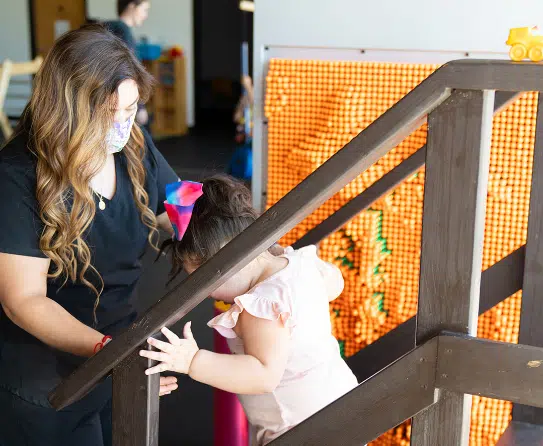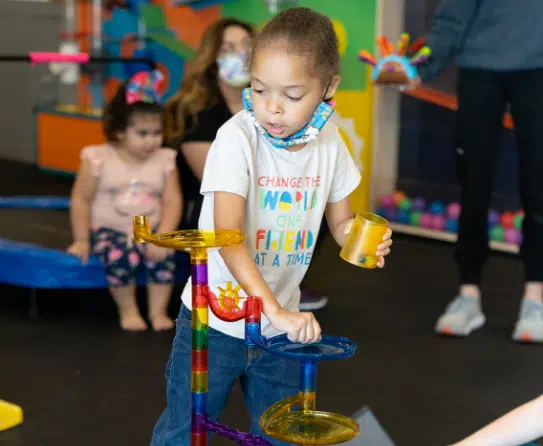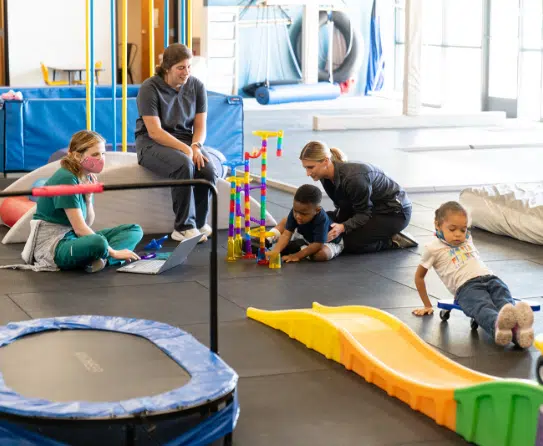Pediatric Therapy
in College Station & Huntsville, TX

Worried about your child’s development?
Get peace of mind with our free developmental assessment!
Our Therapy Services
Your family deserves access to care that will improve their quality of life, which is why we offer a wide variety of therapy services for children and adults in College Station and Huntsville, TX.
Pediatric Speech-Language Therapy

Communication is a vital part of life, and speech-language therapy can help your child improve their speech, comprehension, and ability to share their ideas clearly with others. Not only can this build your child’s self-confidence, but it can set them up for life-long success in school, relationships, and their future career.
Pediatric Occupational Therapy

Even though your child doesn’t have a job, they do have occupations, the activities and tasks they do every day. If your child struggles to handle daily tasks like getting dressed, taking care of their hygiene, going to school, playing with others, or behaving well, occupational therapy can find out why. With specialized care, your child can learn the skills they need for their overall happiness and wellbeing.
Pediatric Physical Therapy

If your child has trouble with movement due to a developmental delay, medical condition, or recent injury, our physical therapists can help. We can improve your child’s gross motor skills like balance, coordination, and strength so they can safely play, explore, and learn. We also offer wheelchair fittings and injury rehabilitation to support your child’s freedom to move.
Pediatric Feeding Therapy

A variety of nutritious foods is essential for your child’s overall health and development. If your child is a picky eater, struggles to nurse, chew, or swallow without choking, or behaves poorly at mealtimes, they may benefit from feeding therapy. Our experts can help your child overcome their feeding difficulties so they can enjoy delicious meals with family and friends.
Pediatric Interactive Metronome

The Interactive Metronome is an incredible tool that can help children improve a variety of skills such as focus, coordination, memory, stamina, language comprehension, and much more. This revolutionary system feels like a video game, so your child will love working on their developmental skills. It also tracks your child’s progress over time so you can see how much they improve!
Adult Therapy Services

As part of our commitment to provide access to care for everyone, we are proud to offer adult patients the same high-quality therapy services as we offer children. If you’re recovering from a recent illness, injury, or surgical procedure, our specialists can help you get back to living your best life. We also offer treatment through the VA’s Community Care program to ensure our veterans can access the care they need.
Why Choose Believe Therapies?

See What Our Clients Are Saying!

“I was referred to Believe Therapies by a friend and I can’t say how much we love it! My kids have seen a tremendous improvement. All of the therapists are very knowledgeable and care about their patients. The front office ladies are amazing at accommodating my schedule, great communication if appointments need to be rescheduled. We LOVE Believe Therapies!!”
-Lupita

“I have seen such an improvement with my son since starting therapy at Believe Therapies. His speech, occupational, and physical therapists are all so great and really care about helping him meet his milestones. The staff is so accommodating to our schedule and are super friendly. I’m so glad we started therapy here!”
– Kara Torres

“We were referred here by my son’s pediatrician and he absolutely loves it!!!!!! He has made so much progress since coming here. He enjoys it so much that he reminds me to take him here before going to school. Cameron looks forward to his sessions . The OT’s and the Speech therapists are all awesome. They Give awesome feedback and the staff are friendly too. Highly recommend!!!!!”
– LaTia Taylor
Contact Us for More Information
Do you have a question about our services? Reach out to us using the contact form below and one of our staff will be happy to help!

